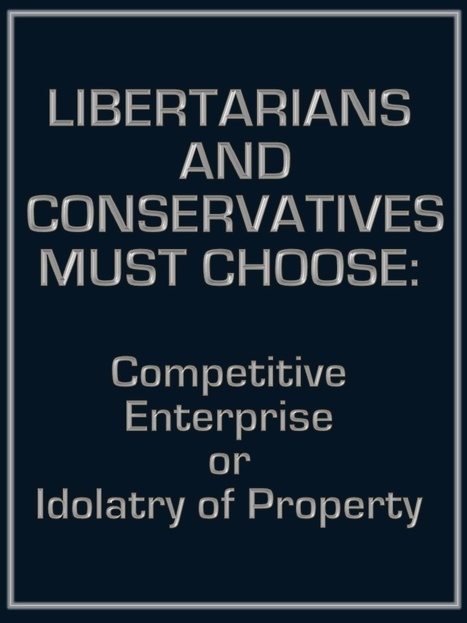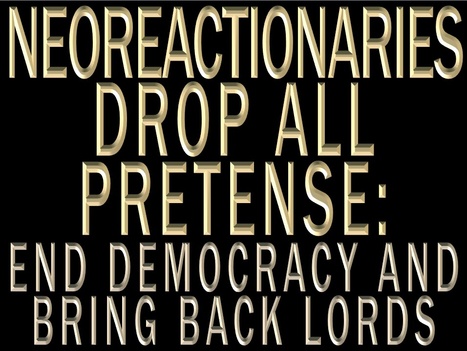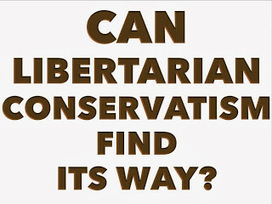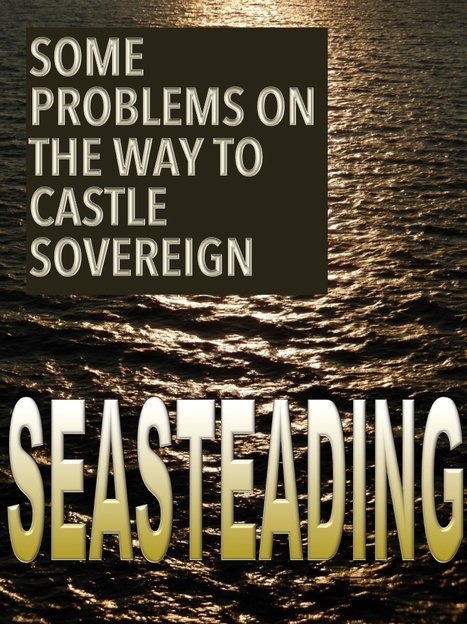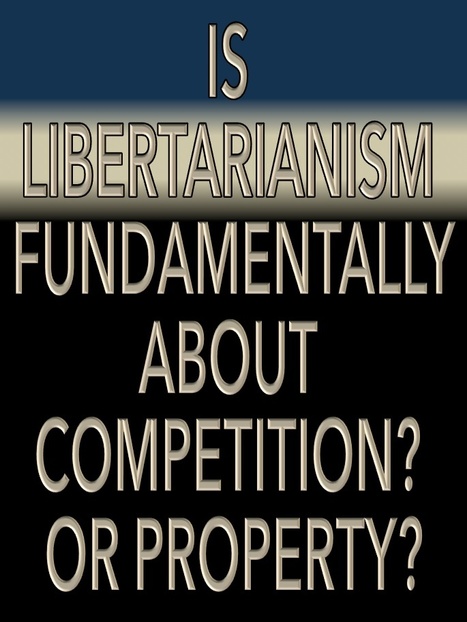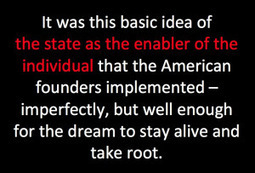 Your new post is loading...
 Your new post is loading...

|
Scooped by
GDB
|
"The issue should not be government. It should not be unlimited and unalloyed idolatry of personal property, which is the path that the libertarian movement has gone down," says David Brin, a science fiction writer and self-identified "heretical libertarian." "Libertarians need to be reminded that, across 6,000 years, the greatest enemy of free enterprise, of market enterprise, innovation, creative competition... have always been oligarchs," says Brin.

|
Scooped by
GDB
|
I've said it before and must (alas) repeat it ad nauseam. Many of our modern struggles -- in the U.S. and across advanced societies -- could be altered if both sides actually (for the first time) read Adam Smith. The left would learn that he was not the viciously cruel exploiter of the masses that dopey campus ranters portray him, but rather, the first modern thinker to propose a generally flat and fair (if highly competitive) society, one moderated with many kindnesses that he defended in The Theory of Moral Sentiments. Though yes, he maintained that society could better afford kindness if it maintained a vibrantly creative -competitive marketplace for great new products and services. A forecast of stunning accuracy.

|
Scooped by
GDB
|
Specifically, the perversion of "free enterprise" away from its Smithian meaning of maximized competition and toward a meaning that Adam Smith openly, repeatedly and vociferously despised... the protection of uneven influence and collusive power in the hands of private oligarchy.
Let us be plain. Across 4,000 years of recorded history, there has been no greater enemy of open competition than collusive, wealth-centered aristocracy....an enemy that killed every market until Smith came upon the scene, and that has done everything in its power - through the promulgation of Culture War" - to distract from the word "competition." The word that ought to be the true focus of any genuine libertarian. Any libertarian who was not a monstrously hypocritical dunce about human nature and history, that is.

|
Scooped by
GDB
|
The Left-Right model of modern politics has reigned long and unchallenged. Despite the fact that the paradigm is ill-defined and impossibly contradictory, people continue aligning themselves along a single, narrow line from the so-called “far left” to the so-called “far right.”
Just what do news reporters mean when they speak of “right wing Shiite militias”? Or when they refer to Putin's opponents alternately as “reformist leftists” and “the conservative (ex-communist) right wing”? Mostly, it is space-filling jabber, meant to gloss over the fact that the old model doesn't work, and never has.

|
Scooped by
GDB
|
Adam Smith essentially founded our modern phase of the Western Enlightenment by anchoring a central postulate -- one that Pericles and Locke discussed earlier, and that others, like Hayek, later embellished. The postulate thathuman beings are supreme rationalizers and self-deceivers.
Moreover, across 4,000 years we’ve seen that whenever a small group of men become powerful enough to control an economy and command-allocate its resources, they will do so according to biased perceptions, in-group delusions and fatally limited knowledge. Whether they do the normal oligarchic thing -- cheating for self-interest -- or else sincerely try to “allocate for the good of all,” they will generally do it badly. As a blatant recent example, Robb cites the collapse of the Soviet Union.

|
Scooped by
GDB
|
The American Revolution serves as a Rorschach test that reflects the obsessions of each succeeding generation. In the 1920s, Marxist notions of class struggle dominated and thus even anti-communist historians viewed the rebellion as a phase shift from monarchal domination to empowerment of the bourgeoisie. In the forties, literalist scholars started instead taking the Founders at their word — that the Revolution was an idealistic exercise in limiting the scope of government.
As in all civil wars, many felt their blood boil over local and personal grievances, spurring groups of neighbors to call themselves “tory” or “patriot” while riding forth to settle old scores. But for our purposes here, it suffices to demolish the pat and absurd narrative of today’s right, that the rebellion was all about… or indeed had much of anything to do with… the basic amount of taxation.

|
Scooped by
GDB
|
The key trick of the Enlightenement was a very strong mythology of egalitarianism, individualism, pragmatism and liberality --- the ideal of a level and fair playing field, in which good ideas should win out over bad ones, without interference by stodgy or biased authorities. Adam Smith taught us -- and the American Founders instituted -- ways to benefit from arenas of competition in which no single person's (or narrow cabal's) delusions may reign -- but instead products, policies, theories and justice are wrangled, tested and refined in four great arenas -- markets, democracy, science and courts -- where avoidance of criticism or error-discovery is difficult, even impossible over the long run.

|
Scooped by
GDB
|
What is essential -- and Adam Smith and F. Hayek and virtually all sane economists down the line agree with me -- is Maximized Transparency. So that all players in capitalism and politics and society (not just privileged elites) can know enough -- and have time enough -- to make informed decisions. The lies, obfuscations and concealed identities must stop. THAT will result in more efficiency and (ironically) even lowered regulation. Indeed, transparency is theonly rational alternative that can manage to reduce government involvement in markets, period.)

|
Scooped by
GDB
|
The libertarian wing of conservatism ought to be the portion that non-leftist liberals and pragmatic moderates could negotiate-with. All three groups appear to be motivated by a shared set of general goals. A dream of maximized individual opportunity and freedom. An aversion to bossy accumulations of undue power. A belief that unleashed human creativity can solve a vast array of problems and that tomorrow could be better, as a result. These commonalities ought to make for lively, good-natured debate over the details, e.g. whether to use the state or laissez-faire or a tuned-markets to solve this or that problem.

|
Scooped by
GDB
|
nspired by Ayn Rand, PayPal co-founder Peter Thiel, along with Patri Friedman and others, are helping the Seasteading Institute plan a floating 'start-up country' off the coast of San Francisco -- built on oil-rig like platforms in international waters. Here residents will be able to live by Libertarian ideals, free of regulation, laws, and the welfare state.The core aim is to escape meddling by any modern states - mostly advanced enlightenment democracies, with their heavy taxes and regulations, while seasteader owner members will still retain full, web-accessed control of their investment portfolios and dividend incomes from those societies. This anisotropy of flow in information, income and influence may be difficult to maintain. It will be necessary to exert great influence on those democracies (the current program) since they have big navies and they influence Law of the Sea jurisprudence.
|

|
Scooped by
GDB
|
Many aspects of the SETI/METI debate bear on our personal beliefs about the nature of intelligent beings, including their rights, obligations, and potentials in the context of a much, much larger scope of space and time. For example, would our favorite models of “human nature,” including the importance of individuality, apply equally to a sapient race descended – say – from pack carnivores, like wolves? Or solitary hunters, like tigers? Or solipsistic omnivores (bears), or herd herbivores? Or ants?

|
Scooped by
GDB
|
“Can transparency and libertarianism complement each other?”
Now let’s have the simple answer first. Yes. A sane, better-focused libertarianism would be utterly compatible with transparency. In fact, it should be the very top priority.
Both Adam Smith and Friedrich Hayek proclaimed that markets are healthy in direct proportion to the number of skilled and knowing player-participants. Indeed, one chief indictment against every pre-modern economic system is that nearly all of them were based on “allocation” of resources by elites. Allocators are inherently knowledge limited and likely to be delusional, precisely because they are few.

|
Scooped by
GDB
|
Bitcoins were designed from scratch with ultra-libertarian values in mind. There is no central repository, mint or controlling entity. Some suspect that the original designer -- pseudonymous developer "Satoshi Nakamoto" -- may have kept "trapdoor" means of control. (In fact, I have my own reasons for (sort of) hoping it is true.) But as more and more Bitcoin sub-servers are created from open source kernels, any such control mechanisms will inevitably decay… as new figures attempt to plant their own self-interested mechanisms into the sub-server hosts that they control and proselytize upon others.
But put aside those paranoid (if wholly realistic) musings. Part of the system's libertarian appeal is that it appears to be free of any overt and overall human control that could then be suborned or else co-opted or controlled by a corporation or government.

|
Scooped by
GDB
|
Here is the fundamental political fact of our times, amid phase three of the American Civil War. The gulf between the richest 1% of the USA and the rest of the country got to its widest level in history last year.
The top 1% of earners in the U.S. pulled in 19.3% of total household income in 2012, which is their biggest slice of total income in more than 100 years, according to a an analysis by economists at the University of California.
Also, the top 1% of earnings posted 86% real income growth between 1993 and 2000. Meanwhile, the real income growth of the bottom 99% of earnings rose 6.6%.

|
Scooped by
GDB
|
Peering ahead with those vaunted prefrontal lobes, we try to anticipate problems -- and we've grown better at it! But ultimately, a civil society must also be strong and resilient enough to deal successfully with unexpected surprises. The shocks that we didn't anticipate. Anticipation makes up a surprisingly large fraction of our economy, including many services practiced by specialists and professionals -- intelligence officers, stock market analysts, business managers, and so on. Their efforts to peer ahead -- betting, allocating, managing, gambling, investing, hedging -- play a large role in the success of markets, for instance.\ Resiliency is less focused and depends much less on specialization. Rather, it is grounded upon the quick reactions of countless individuals and generalists, responding to events as they happen, whether it's the arrival of a new product... or news of a hijacked plane crashing into a skyscraper. (Naturally, a person can be a specialist in one area and a generalist in many others.)

|
Scooped by
GDB
|
ATLAS SHRUGGED is, after all, an indictment of modernist, enlightenment, Smithian-liberal civilization. To Rand, this "great experiment" has all been one big mistake, doomed to expire from its own internal contradictions.
Hence, Ayn Rand shows us society making one dismal choice after another -- an endless chain of socialist or bourgeois-oligarchic or meddlesome-statist outrages against individual initiative. Endearingly, Ayn Rand despised all three of those centers of villainy equally, portraying them uniting to pass laws that punish or seize companies who "compete too well."

|
Scooped by
GDB
|
Before we appraise the modern fetishism called Faith in Blind Markets(FIBM), it is essential that we cover theolder fallacy of GAR, or guided allocation. This notion contends thatsociety’s best, brightest and wisest should decide how capital will be invested, which goods will be produced, and who will work at what tasks.
To those who were raised in the 20th Century, this description surely sounds likesocialism. But that is a narrow and parochial view of GAR. A glaring logical and historical fallacy. An absurdity, in fact. (As a test of your own flexibility and sagacity, stop here and ponder for a moment why I call this reflex association preposterous. Why do I say that socialism is NOT the foremost or exclusive exemplar of guided allocation? Think "history" and stretch your assumptions a bit, before reading on.)

|
Scooped by
GDB
|
Western Enlightenment legacy nations are finished performing their historical function -- defending individuals and small enterprises from the predatory savagery that the powerful always (and I mean always) used to crush and eliminate competition from those below them. It happened in 99% of generations across 6000 years. Adam Smith knew, described, and denounced the oligarchic-monopolistic attractor state as our worst failure mode (often called feudalism). And in recommending counterbalancing forces, Adam Smith pretty much invented an entirely new role for the nation state, which had formerly been merely a power tool of oligarchy. It was his basic idea of the state as enabler of the individual that the American Founders implemented -- imperfectly, but well enough for the dream to stay alive and take root.

|
Scooped by
GDB
|
Antipathy toward increasing world structure or 'government' has different sources, depending on where you look.
Dictators and oligarchs see it as a threat to their local power.
Small nations see it as a vehicle for hegemony by the US et. al.
Major corporations see it as likely to become yet another taxing authority.
Western political classes see it as arising out of the UN, and thus becoming an impotent talking society in which action becomes impossible and 3rd world perceptions dominate.
Americans almost instinctively perceive it as a potentially dangerous accumulation of centralized power.
|



 Your new post is loading...
Your new post is loading...






